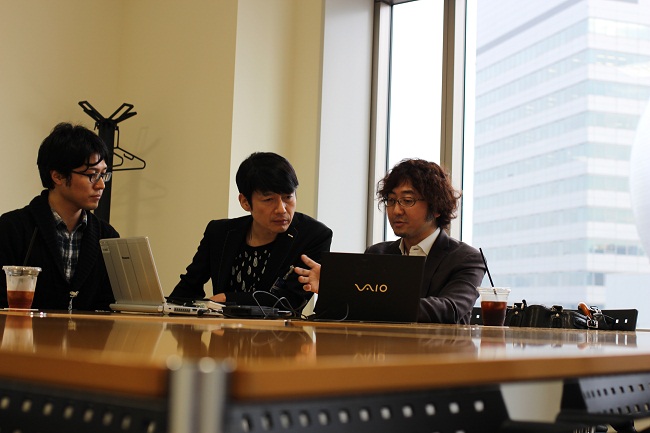Have you ever heard about a service called LINE? None of our readers will likely respond “No”.
This gigantic messaging app that everyone knows about first began its services four years ago in June 2011. It has since grown to boast just under 600 million registered users, chiefly in Asian countries such as Japan, Thailand, and Taiwan. It is also rumored for listing at a market cap of around $10B.
What about the person who launched LINE from nothing and developed it as a massive service in Asia?
Again, many people will have the answer to the question. It’s Akira Morikawa, super business proprietor who left his position as president of LINE this past March and chose to pursue an aggressive journey as an entrepreneur.
GMO VenturePartners will initiate a seed funding round in C Channel, a new service that Mr. Morikawa will be starting on April 10.
We were able to get a look at the sense of speed and spirit of this superman Morikawa on April 6, 2014, close to the very eve of the start of its services. Here is an introduction to a part of what we learned.
C-Channel where Akira Morikawa serves as representative, will begin beta services for the video fashion magazine “C Channel http://www.cchan.tv/) on April 10, 2015. The service is aimed at producing and distributing videos on Japan’s strength areas of fashion, food, travel, and other fields of information to the expanding video markets of the world. Members from the television and Internet industries will gather together to produce and distribute videos of high quality and lengths. Initial services will be Web-based, with plans to offer smart phone apps to follow.
The GMO Internet Group is planning to offer support through infrastructure such as servers.
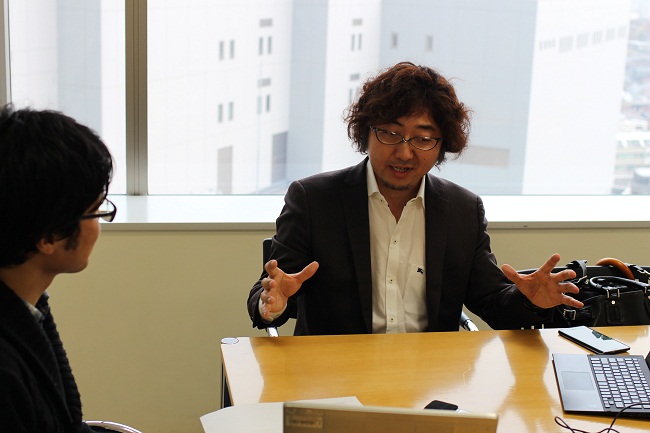
Morikawa: With things finally settling down, I’m planning to go with barely any sleep in our challenge.
As I think the last time that we spoke, I used the term “pinterest of videos”, we’ll start by focusing our targets to some extent and boost our quality as we go. Our targets will be women, and we’ll produce contents on topics like fashion, gourmet, and travelling in a magazine-like style.
I’d like to watch the figures and consider whether we should narrow down our target groups, for example overseas or regional, and also narrow down or otherwise broaden our categories.
I’d like you to take a look at this: this is a product that I saw on a PC and a smart phone.
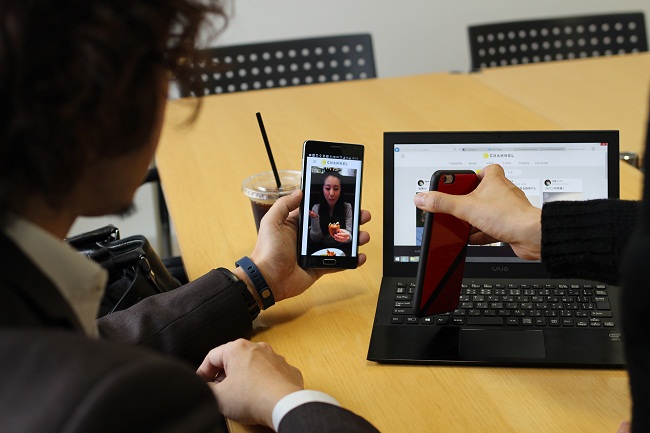
Morikawa: This is a shot that was taken by the subject herself. There are both pictures that were taken by a professional and those that were taken by amateurs, and this is the latter, taken by the subject herself. There are also images where people are pictured with their friends in pairs; they’re going ahead and taking and saving a lot of pictures and uploading them.
Images that are taken by professionals can be focused on targets to some extent, for example something on music would be fine and with a cultural flair would also be possible. Besides those, I think things like coverage of fashion shows would work, too.
Muramatsu: It’s that “vertical” format that makes it so exciting…
Morikawa: Yes, really. Like it’s easy to understand intuitively, verticals are really good for shooting people, especially when it’s a picture of a single person. The way we shoot in TV, we’ve always shot multiples. And the main point now is that because the C in C Channel stands for communication, we want to shoot like we’re talking to our subject. So the distance is very close, like the concept that we’re talking to a friend who’s right in front of us. I don’t think there are many people in the world who shoot seriously like this so I figure it might not be too easy for someone to copy us.
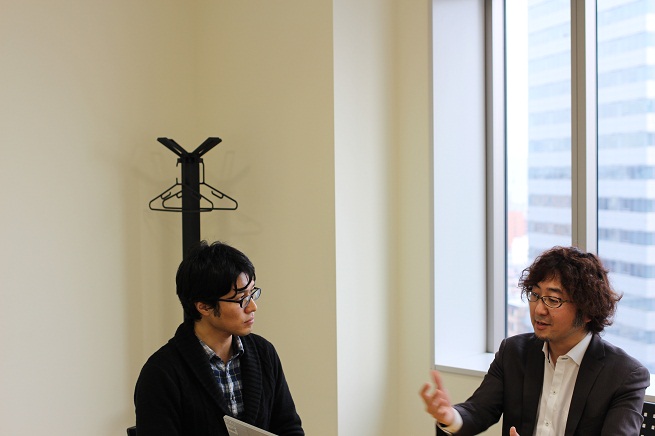
Miyasaka: We’d like to go to some general questions now. This is something that I think everyone is interested in—why is it that you made the decision to start a business at this particular time?
Morikawa: Yes, well, having been in the LINE business for a long time I feel that there are some things I’ve really finished doing. I want to reset things again. Besides that, I support a lot of entrepreneurs and some of them occasionally remark harshly that I’ve never started my own business (laugh). So there’s that, where I figured all right, I’ll go ahead and do it then.
Miyasaka: And in that decision, why did you want to compete in this market, in this particular domain?
Morikawa: It wouldn’t have much meaning socially if I set out to make profit by doing games or by copying services that are growing. I wanted to do something that would have an impact on society. But at the same time, I think it’s still a bit too soon to go into education or healthcare or energy.
And with these ideas I thought that maybe regarding the media it was the right time for global innovation. In my long experience, I feel the same type of atmosphere as I did when we went from terrestrial television to multi-channel cables and then CNN and MTV emerged. My own background is in the media industry (Mr. Morikawa’s background is with Nippon Television Network), and I figured there has to be a considerable number of people among managers who would like to bring change to the media. This is where it’s possible to both “change society” and “produce profit” so I did have the idea that this might be the best thing for me to do.
Miyasaka: I think the members of your current team are people who have superb skills in their various fields. What was their motivation for joining your company?
Morikawa: We may have worked together in the past and they know me well in the first place, so they have a general idea just how serious I am. In that sense I’ve always shown people that when I get serious I’ll always produce results. I explained things to them and they all made their decisions in an hour. It’s something I’m very grateful for.
Miyasaka: You mentioned earlier that you will go without sleep. As to your level of seriousness?
Muramatsu: It’s something else to hear that Morikawa-san is pulling an all-nighter to do this.
Morikawa: Oh, no, no! (laugh) Business is, after all, something where you have to put your life on the line. Even then you can fail, so I’m at the point where I’m telling myself that I can’t do this half-heartedly.
Things are pretty intense and moving at considerably fast speeds.
Miyasaka: I think you have experience that you nurtured while rapidly growing the LINE business. What are some of the things that can be leveraged in your new initiative?
Morikawa: First there’s speed, as I generally have empirical values as to how we can accelerate our speed. Then there’s also design. I think there are hardly any IT companies in Japan that have strengths in design. There’s also overseas development. You can sum that up in a word or two but with different cultures and communications in each country, this is the part where we decide what we set out to pursue. This is something that we won’t know until we make our deployments but from my experience, it isn’t possible to win abroad unless you’re considerably focused. In a Japanese sense I think that places like Thailand and Taiwan are locations where you absolutely have to win.
Miyasaka: What are the directions for your mid- to long-term objectives in the next three to five years?
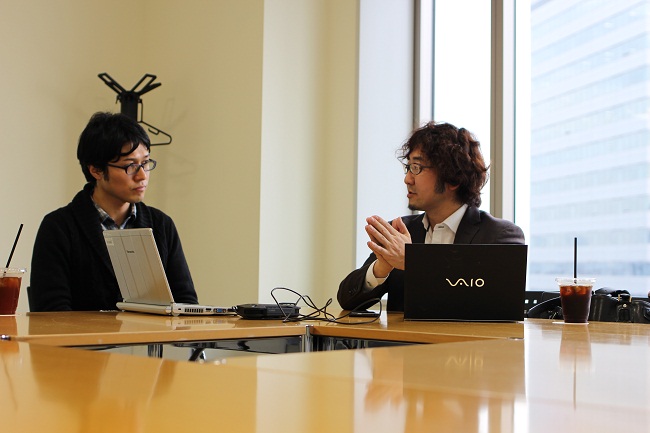
Morikawa: I would like us to be an entity like MTV or CNN in the age of online media, where the media transformed and MTV and CNN emerged, and it won’t be possible to win if we’re darting about. When I looked at their past histories it seemed that they had created powerful brands, boosted the quality of their content, and then made overseas deployments all at once, so it’s probably very important to complete those things within the next year. If we don’t, then others will catch up with us.
Muramatsu: The first thing that comes to mind is Tencent. I think the situation is that they were doing QQ to begin with, saw the success of LINE, and applied it to WeChat. I think other big businesses are likely to take these types of moves as well.
And a way to put it is that when innovation really happens with something big, things become difficult for others to do. I think with WeChat they were so determined that they did it by discarding all existing profit. I don’t think something like that is very easy to do.
Conversely, with this particular initiative, how do you feel? Is it tough if it’s something that already exists or is it something that everyone does with add-ons?
Morikawa: From the perspective of the media industry it’s extremely hard to do. The ads would be competing with one another, too.
We spent a considerable amount of time on this particular occasion in advising the people working on the production to make the images vertical—why they need to be vertical, what we’re going to do with our conventional technology. It’s a completely different approach for the people who are being featured in the videos as well, so there was a lot of resistance in the beginning.
They probably have pride, so there’s no way the media industry is likely to go so far as C Channel. It’s the same as the film industry not doing imitations of television.
On the other hand, when we’re talking about IT companies there aren’t many that understand design or content, so there might be challenges there as well.
Miyasaka: On the lineup of shareholders, I think it’ll be very important where you procure your funding. Which aspects did you focus on in your selection?
Morikawa: First it has to be people who can understand these businesses. And furthermore, I wanted companies that have strong impact on society to be the first to join us. There were various other opinions but I’m more or less trying to change those so unless we have them join us when we have a certain level of strength, our speed can rather slow down. So we first asked people who have influence over the IT industry, who can also empathize with us to take part.
Miyasaka: Which are the areas where you have expectations for our Group?
Morikawa: First we’d like people to empathize with this way of thinking, our desire to go out and capture the world. There has never been a Japanese media company that took the world, so that’s something that we would like to do, and then there’s also a desire to go out there and take a look at others who have a bigger scale of business than what we’re doing. Video is very close to the infrastructure business, so that’s an extremely significant strength that the GMO Internet Group has. You’ve also offered us free proposals for a year and we hope that we can work together and spread it out abroad. You also have various features in your Group and we’re eager to collaborate with you in various ways.
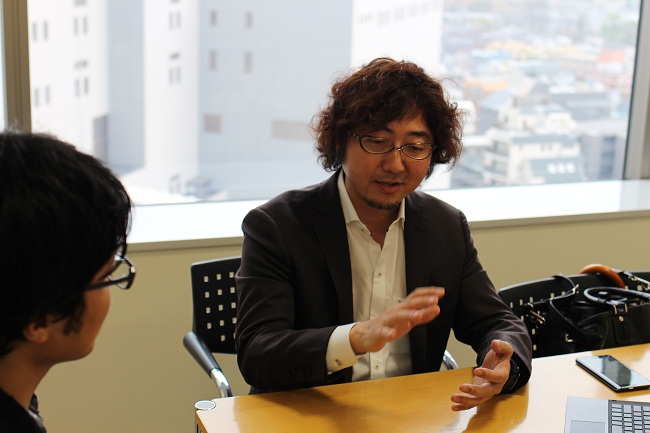
Muramatsu: There’s something I’ve really wanted to ask you for a long time—I went to numerous lectures that you gave when you were with LINE when you said that LINE doesn’t have a business plan or target figures.
I can make sense out of the fact that it’s B2C and C2C so you don’t have these, but there should still be a certain level of target values, making me wonder what it means that you don’t have these at all—I’ve always wanted to ask you this. Was this really true?
Morikawa: It’s generally inside my head. The thing is, well, if you have a few KPIs and you multiply them by unit prices, you’ll generally get values. The costs are generally for human resources, office costs, and how we’re going to squeeze or open budgets for marketing, which I basically have a sense of in my head, so it’s just a matter of not sharing it too much.
When the president of a company mentions figures too often the employees will probably have a strange awareness of those numbers so I tried to talk about things like the quality of our service or the most important key KPIs.
But of course we had an appropriate awareness of figures behind the scenes, as the most important thing is cash flow. But in the sense of creating a corporate culture, the resulting figures should increase if we focus on making something fantastic, so I guess that’s the method that I took.
Muramatsu: Will it be the same at your new company?
Morikawa: Yes, well, I think we’ll get a number of very simple KPIs so we can lower costs as we watch how the performance of those figures effects investment and fine-tune for the best impact until around the summer, and then maybe we’ll have an image that’s clearer than with money. So with a little initial investment we can watch how which KPIs will become, ensuring of course that figures are properly tracked. I’m no artist so I hope you rest assured on that point—although the style of my hair may leave other impressions (laugh), I’m well aware of the figures.
Muramatsu: From what you’ve told us so far it’s really sounded like you’re “creating a new MTV of the smart phone era”. What aspects of MTV were revolutionary to you?
Morikawa: It’s hard to describe this but MTV and Virgin, I think they created brands that stir excitement just by hearing their names. There are many companies in Japan that are a little weak when it comes to brands. Sony used to be good but they’ve lost that touch. A media brand from Japan that generates excitement—just that alone would be something great, I think. Those are the results, and companies first need to make money, but still I don’t think there’ll be profit if it isn’t something exciting. What the Japanese really need to do now is to create things that generate excitement even if it might involve costs. So for ads as well, not bargaining and receiving money instead for things that people can truly empathize with, rather than what Japanese companies are busy doing right now, lowering costs and prices.
Muramatsu: It’s just a feeling I have but that the way I perceive them, you might say that MTV and Virgin have focused on the young people who weren’t shed much light during their times and created an extremely new pop culture or a counter culture while speaking on their behalf. I think MTV emerged immediately in the generation of the cable TV and in that sense, Snapchat started with the teens and merged a unique segment that hadn’t been grouped much and was scattered into a culture. So the image might be like this: “there’s a lot of desire for delivering videos but no platforms anywhere, and that’s why nothing’s happening,” and you would like to propose a counter culture against that sort of situation. Would that be an accurate description of your concept?
Morikawa: Yes, that’s part of the reason why we teamed up with ASOBISYSTEM; there’s a sort of element like artist + talent, including Kyary Pamyu Pamyu. I think in the current case of Japan, things won’t go well if you’re too stiff, with some laxness, so the way to create is to explore the right amount of dosage in those areas and to produce a star as a result. Concept-wise, that’s the type of image that I have.
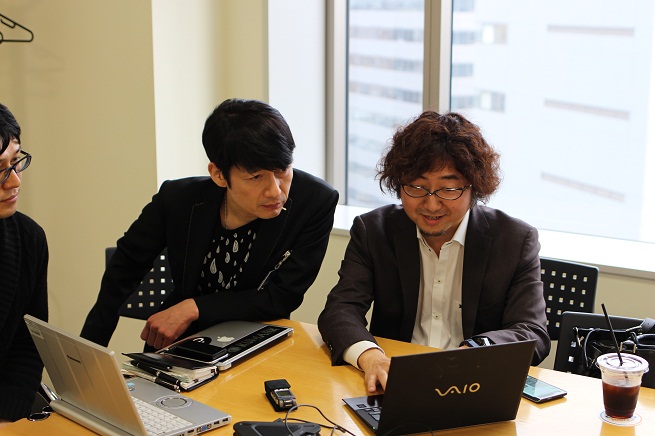
(The interview was joined mid-session by GMO Internet Group CEO Kumagai)
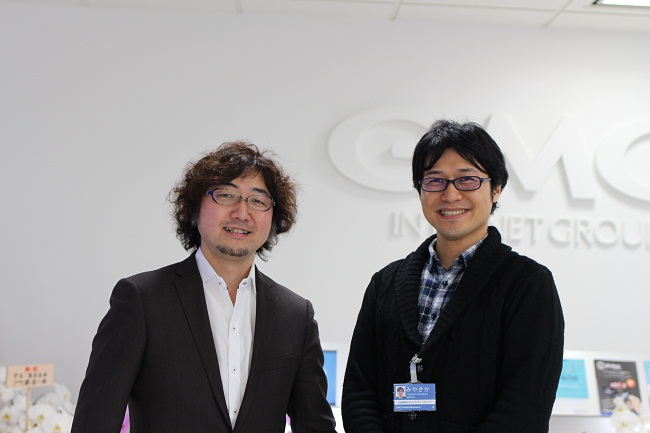
GMO-VP: It’s an honor to be able to be a part of this very interesting plan!
C Channel: http://www.cchan.tv/
